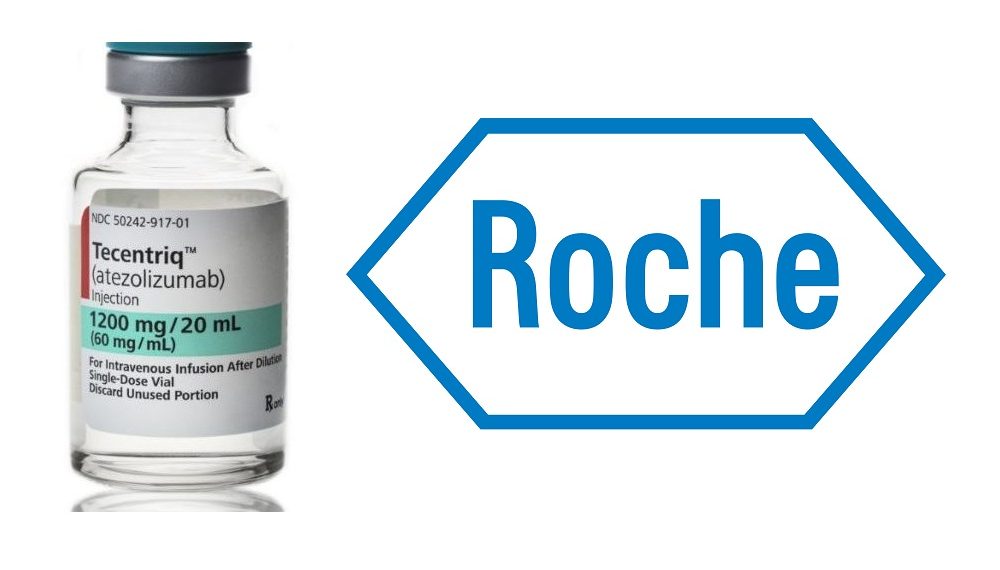Roche announced that the Phase III IMpower131 study met its co-primary endpoint of progression-free survival (PFS) and demonstrated that the combination of TECENTRIQ (atezolizumab) plus chemotherapy (carboplatin and Abraxane [albumin-bound paclitaxel; nab-paclitaxel]) reduced the risk of disease worsening or death (progression-free survival; PFS) compared with chemotherapy alone in the initial (first-line) treatment of people with advanced squamous non-small cell lung cancer (NSCLC).
Safety for the TECENTRIQ and chemotherapy combination appeared consistent with the known safety profile of the individual medicines, and no new safety signals were identified with the combination. At this interim analysis a statistically significant overall survival (OS) benefit was not observed and the study will continue as planned. These data will be presented at an upcoming oncology congress.
“Squamous non-small cell lung cancer is difficult to treat and there have been limited new treatment options over the last few decades,” said Sandra Horning, MD, Roche’s Chief Medical Officer and Head of Global Product Development. “We will share the IMpower131 results with global health authorities and we look forward to seeing more mature overall survival data.”
As per the statistical analysis plan in IMpower131, Arm B (TECENTRIQ plus carboplatin and nab-paclitaxel) must demonstrate a statistically significant OS result vs. Arm C (carboplatin and nab-paclitaxel), before an analysis between Arm A (TECENTRIQ plus carboplatin and paclitaxel) and Arm C can be made for PFS and OS.
Currently, Roche has eight Phase III lung cancer studies underway evaluating TECENTRIQ alone or in combination with other medicines and five are expected to report this year.
IMpower131 is a Phase III, open-label, multicentre, randomised study evaluating the efficacy and safety of TECENTRIQ in combination with carboplatin and nab-paclitaxel or TECENTRIQ in combination with carboplatin and paclitaxel versus chemotherapy (carboplatin and nab-paclitaxel) alone in people with stage IV squamous NSCLC who have not been previously treated with chemotherapy. The study enrolled 1,021 people who were randomised equally (1:1:1) to receive:
- TECENTRIQ plus carboplatin and paclitaxel (Arm A), or
- TECENTRIQ plus carboplatin and nab-paclitaxel (Arm B), or
- Carboplatin and nab-paclitaxel (Arm C, control arm)
During the treatment-induction phase, people in Arm A received four or six cycles of TECENTRIQ plus carboplatin and paclitaxel , given on day one of each 21-day cycle. This was followed by maintenance therapy with TECENTRIQ every three weeks until progression of the cancer, or for as long as clinical benefit was observed.
During the treatment-induction phase, people in Arm B received four or six cycles of TECENTRIQ, carboplatin and nab-paclitaxel.
TECENTRIQ and carboplatin were administered on day one of each 21-day cycle. Nab-paclitaxel was administered on days one, eight and 15 of each 21-day cycle. This was followed by maintenance therapy with TECENTRIQ every three weeks until progression of the cancer, or for as long as clinical benefit was observed.
During the treatment-induction phase, people in Arm C received four or six cycles of carboplatin and nab-paclitaxel. Carboplatin was administered on day one of each 21-day cycle, and nab-paclitaxel was administered on days one, eight and 15 of each 21-day cycle. In the maintenance phase, participants received best supportive care.
The co-primary endpoints were:
- PFS as determined by the investigator using RECIST v1.1 in the intention-to-treat (ITT) population (Arm B vs. Arm C)
- Overall survival (OS) in the ITT population (Arm B vs. Arm C)
IMpower131 met its PFS co-primary endpoint per study protocol. This analysis of IMpower131 evaluated Arm B vs. Arm C.



















